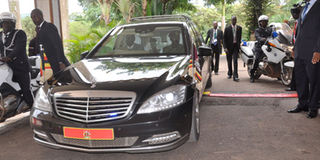Museveni lists economic priorities

President Museveni’s motorcade arrives at Serena hotel for the State-of-the Nation address yesterday. PHOTO BY Geoffrey Sseruyange
What you need to know:
Highlighting the economic progress, Mr Museveni said the size of the economy currently stands at Shs63.3 trillion ($25.3billion), indicating an increase of 5.7 per cent in the current financial year
Parliament.
Sounding upbeat, President Museveni yesterday gave a favourable assessment of the national economy, promised a year of action and talked down concerns about the future of the nation raised by the Opposition.
In his State-of-the-Nation address, Mr Museveni said his government will continue to invest heavily in the agricultural sector and revealed how poverty in the country has declined to record levels despite challenges.
“ Consequently, the proportion of people living below the poverty line has further declined from above 56 per cent in 1992 to 24.5 per cent percent in 2009/10; and now to 19.7 per cent in 2012/13,” he said.
Adding: “Uganda has, therefore, already surpassed the first Millennium Development Goal target of halving the proportion of the population living in extreme poverty by 2015. Some parts of the country have got even better performance figures. When the other areas catch up, Uganda will enter the Middle Income status.”
He promised to tackle persisting economic disparities between the well off and poor with a series of initiatives in the four priority sectors: agriculture, industry, services and ICT, which he said are key to lead to wealth creation and access to employment.
Highlighting the economic progress, Mr Museveni said the size of the economy currently stands at Shs63.3 trillion ($25.3billion), indicating an increase of 5.7 per cent in the current financial year.
However, the President also observed that the instability in South Sudan and unfavourable weather conditions had impeded faster economic growth.
However, after asking farmers to put their emphasis on coffee, tea and milk production, Mr Museveni cautioned about the remaining challenges ahead and warned that a modern economy cannot solely depend on agriculture.
“We must sweat, eating free is not there, this is what the Bible says in Genesis 3:19,” he told MPs at the Kampala Serena Hotel main conference hall where Parliament traditionally convenes for this constitutional address to the nation.
The President reiterated his promise made last June to reorganise the Naads programme in order to help the 68 per cent of Ugandans whom he said are stuck in unprofitable subsistence farming. “If soldiers can use little money (Shs9 billion) to distribute millions of seedlings in the former war zones, why do those handling Naads fail? It’s really embarrassing, but the good news is money is there to help the farmers and it has always been there,” he said.
In mapping out his legislative agenda for the fourth session of Parliament, Mr Museveni promised to table amendments to the country’s electoral law, constitutional amendments and a cocktail of bills such as the Landlords and Tenants Bill 2014 ,ahead of the 2016 general elections.
Responding to calls made by some women MPs from the floor to have the Marriage and Divorce Bill re-tabled, the President asked: “Don’t you remember that the Marriage Bill nearly caused a civil war? I don’t want a civil war in Uganda.”
major highlights of the address
In his State-of-the-Nation address yesterday, President Museveni emphasised the following:
A new awakening noticeable with three trends: Trend one is that science graduates are going into starting manufacturing enterprises; trend two is that those who did general arts degrees are going into farming and other enterprises. Trend three is some of the scientists are being absorbed into the new companies.
Services: (hotels, transport, banks, professional services, etc) emerge as very important sector growing by 5.6%, employs 2,684,290 and accounts for 45.4% of GDP
Industry: Now employs 841,704 persons. The annual rate of growth of the industrial sector has been 5.6%
Population with access to electricity: Up from under 3% in 1986 to 10% in 2009 to 14% in 2013. In rural areas, the share has risen from 0% to 7% over the same period.
The government has set a target of 40% for electricity access by 2022. Over the next ten years, government plans to increase access to electricity to 26% of the total rural households.
Regional market: President says regional market is one of the greatest stimuli for economic growth in the face of global economic problems. Uganda now exports to the region goods and services to the tune of $1.36 billion while importing from the region goods and services worth $671 million.



